The coverage on this blog has ended. For more updates, results and news on South Korea’s presidential election, visit www.koreaherald.co.kr. -- Ed.
Yoon Suk-yeol elected president of S. Korea
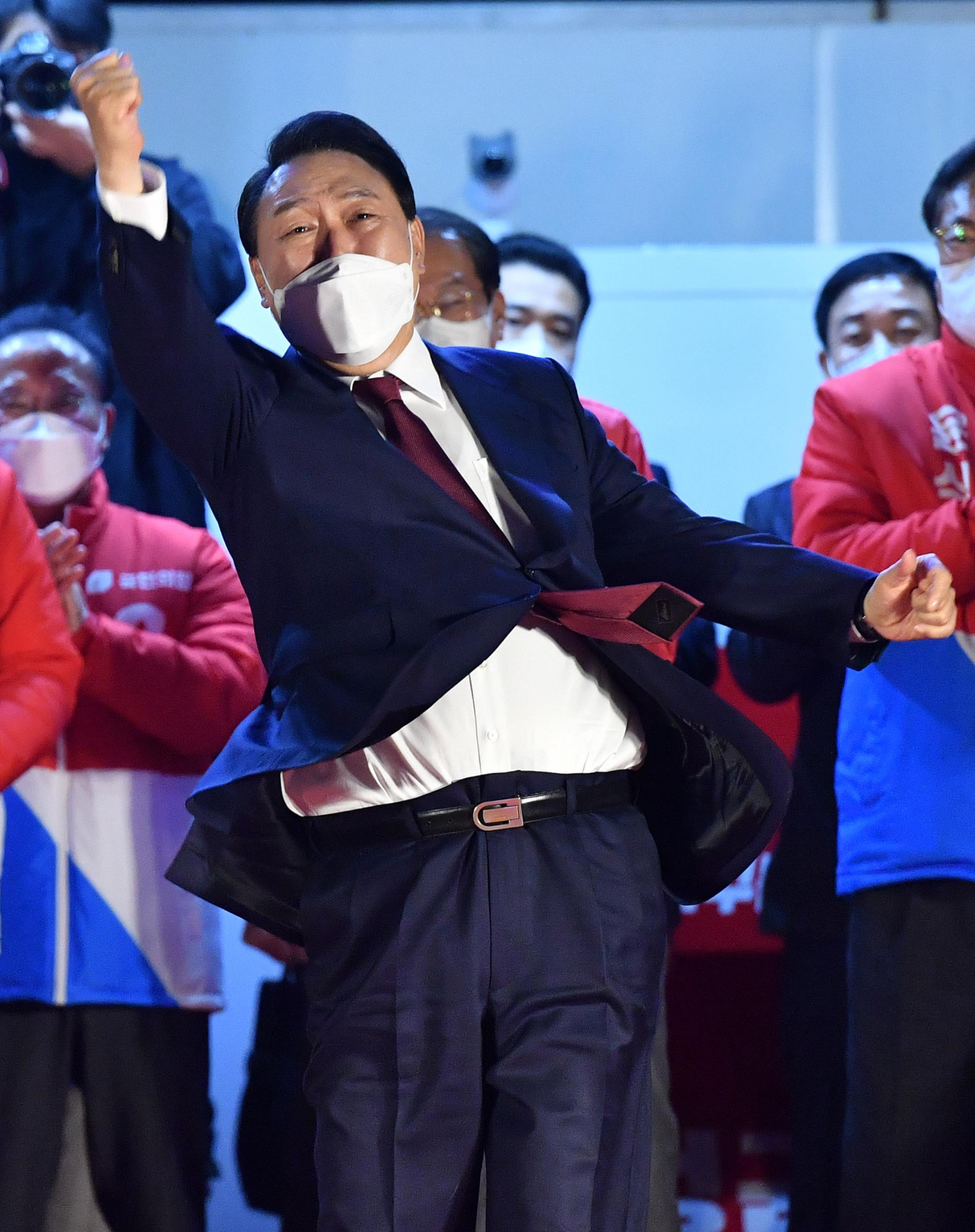 |
Yoon Suk-yeol reacts to his supporters early Thursday morning in front of his People Power Party headquarters building in Yeouido, Seoul. |
Yoon Suk-yeol, a former chief prosecutor and political neophyte, was elected the next leader of South Korea on Thursday in one of the closest presidential elections in the country’s history.
With all the votes counted, the conservative candidate garnered 48.6 percent, against 47.8 percent of Lee Jae-myung, the candidate from the ruling Democratic Party of Korea.
————————————
Yoon edges closer to election victory
March 10, 2022, 2:50 a.m.
Yoon Suk-yeol, the conservative People Power Party’s candidate, looks on course to win the presidential election. With less than 4 percent of votes yet to be counted, 48.62 percent were for Yoon against 47.78 percent for rival Lee Jae-myung of the liberal Democratic Party of Korea.
————————————
Yoon's lead widens
March 10, 2022, 1:37 a.m.
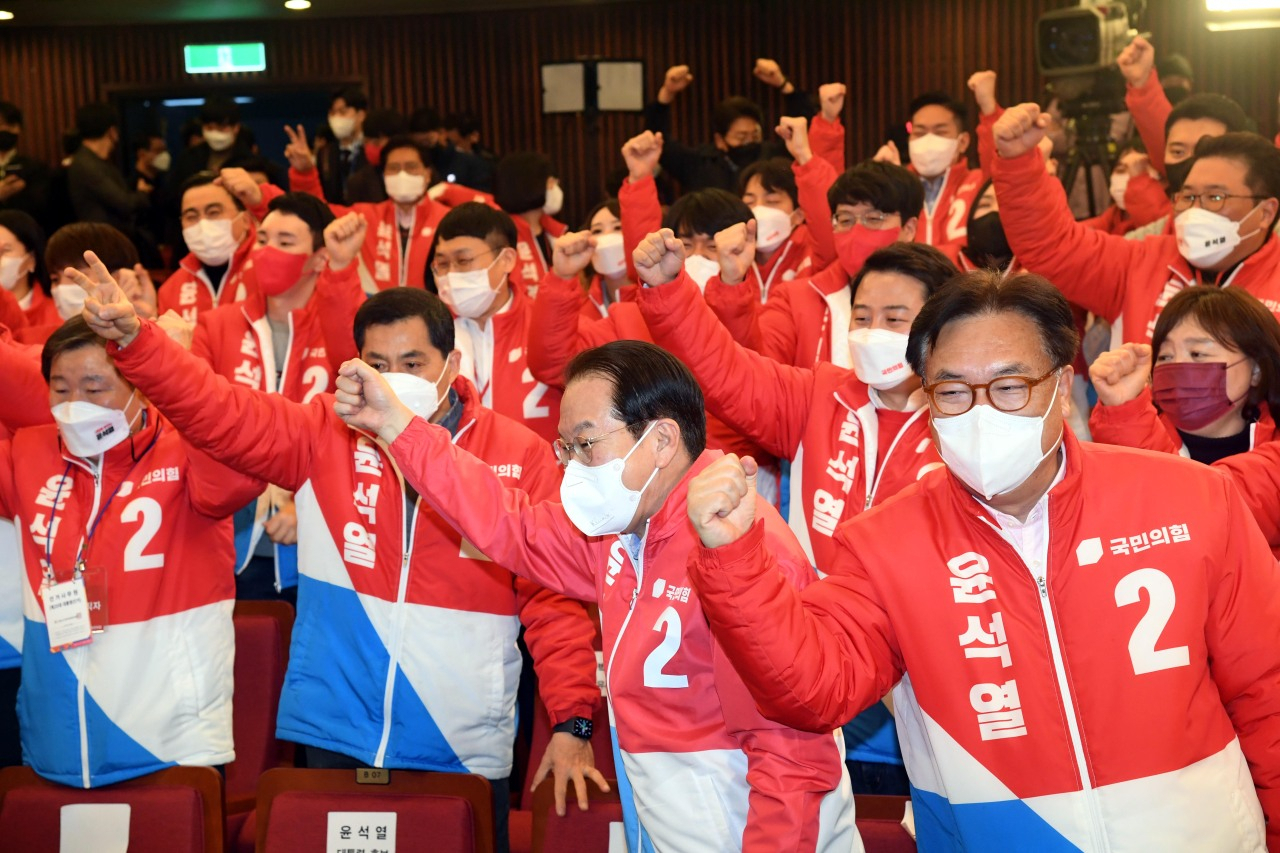 |
Main opposition People Power Party members raise their fists in celebration after its presidential nominee Yoon Suk-yeol took a lead in the poll as the ballot count progressed after midnight Thursday. |
As of 1:36 a.m. Thursday, with about 76 percent of votes counted, conservative candidate Yoon Suk-yeol continued to lead the race for presidency in South Korea. Yoon was about 0.9 percentage point ahead of liberal rival Lee Jae-myung.
The atmosphere inside the People Power Party's election headquarters, which was rather subdued following the release of exit polls showing a close race, completely changed as Yoon pulled ahead.
The party members stood up and started to clap, chanting Yoon’s name in celebration.
At Lee Jae-myung’s headquarters, most of the lawmakers and officials of the ruling Democratic Party had left. Those who remained at the site looked on in silence.
By Jo He-rim (herim@heraldcorp.com)
————————————
With over 51% of votes counted, Yoon overtakes Lee in narrow lead
March 10, 2022, 0:35 a.m.
As of 00:33 a.m. Thursday, Yoon Suk-yeol of People Power Party overtook liberal rival Lee Jae-myung in the race for South Korean presidency.
————————————
With over 40% of votes counted, Lee’s lead over Yoon narrows
March 10, 2022, 0:10 a.m.
As of 00:06 a.m. Thursday, with 40 percent of votes counted, liberal candidate Lee Jae-myung’s lead over conservative rival Yoon Suk-yeol has narrowed to less than 1 percentage point.
————————————
With nearly 22% of votes counted, Lee leads Yoon by 3%
March 9, 2022, 11:26 p.m.
As of 11:26 p.m. Wednesday, with 22.98 percent of votes counted, liberal candidate Lee Jae-myung was leading his conservative rival Yoon Suk-yeol 50 percent-47 percent in what appears to be one of the closest presidential races in South Korea.
Two exit polls, released at 7:30 p.m. after polls closed nationwide, placed the two at less than 1 percentage point apart.
One of the surveys, conducted by three the three terrestrial broadcasters KBS, MBC and SBS, projected Lee and Yoon would get 47.8 percent and 48.4 percent, respectively.
The other poll by JTBC, however, put Lee at 48.4 percent, 0.7 percentage point ahead of Yoon.
————————————
Voter turnout falls short of last election’s record
March 9, 2022, 10:30 p.m.
Voter turnout for this year’s presidential election reached 77.1 percent, similar to the figures from the previous election.
Nearly 8 in 10 eligible South Korean voters cast their votes to elect a new president, including ballots from two days of early voting. Approximately 34 million out of 44.2 million eligible voters ultimately cast their ballots. A final figure is expected to come out sometime Thursday.
The preliminary tally released less than two hours after polls closed at 7:30 p.m. fell short of the 80 percent mark that some had anticipated this year for the first time in 25 years, since the 1997 presidential election. Compared to the last presidential election in 2017, this year’s figure was just 0.1 percentage point short. In 2012, voter turnout came to 75.84 percent. The same figure was 63 percent in 2007.
Since the Constitution was amended for direct voting, the highest figure for voter turnout for the presidential election was seen in 1987, at 89.2 percent. Turnout, however, fell in the 1990s and 2000s, hitting the low of 63 percent in 2007.
In this year’s election, voter turnout was highest in Gwangju at 81.5 percent, followed by South Jeolla Province at 81.1 percent and North Jeolla Province at 80.6 percent.
Jeju Island showed the lowest turnout, marking 72.6 percent.
By Im Eun-byel (silverstar@heraldcorp.com)
————————————
[Photo News] Vote counting begins
March 9, 2022, 8:30 p.m.
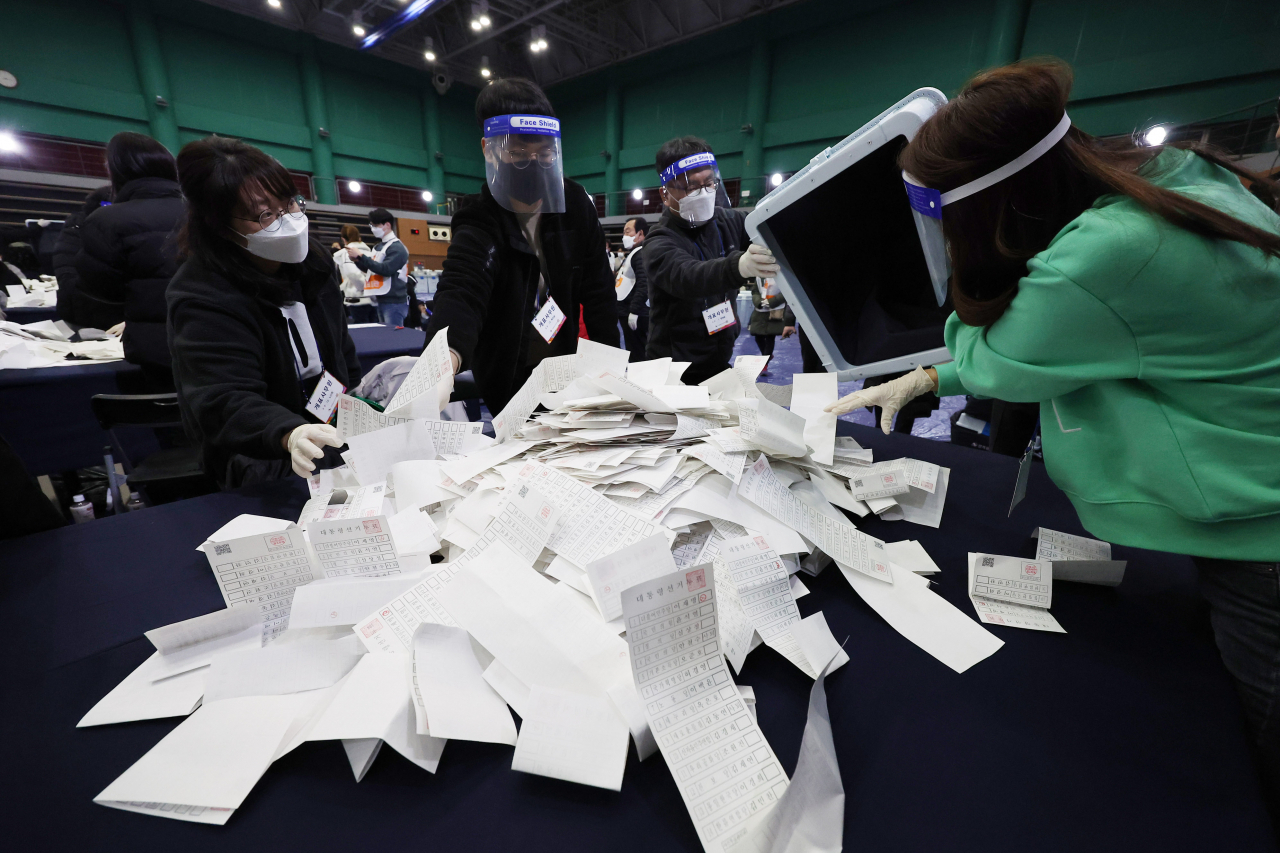 |
Officials unload ballot papers as they prepare for vote counting in Wednesday's presidential election in South Korea. Yonhap |
————————————
Exit polls show Lee, Yoon to close to call
March 9, 2022, 7:45 p.m.
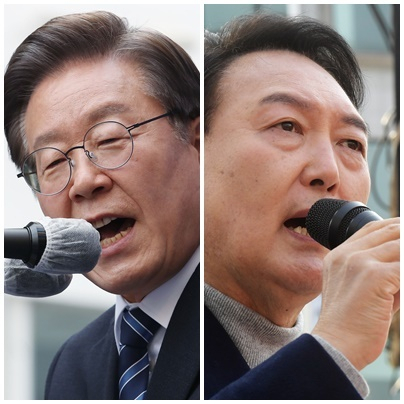 |
Democratic Party of Korea`s Lee Jae-myung (left) and People Power Party`s Yoon Suk-yeol (Yonhap) |
The ruling liberal Democratic Party’s Lee Jae-myung and the conservative People Power Party’s Yoon Suk-yeol are running neck-and-neck in the presidential election, exit polls showed Wednesday evening.
According to exit polls conducted by the country‘s three major broadcasting companies -- SBS, KBS and MBC -- People Power Party’s Yoon is expected to take over 48.4 percent of the vote, edging out his competitor Lee on 47.8 percent.
On the other hand, according to JTBC, which conducted a separate exit poll, Lee is expected to win 48.4 percent of the vote, over Yoon’s 47.7 percent.
By Shim Woo-hyun(ws@heraldcorp.com)
————————————
[Photo News] Voting at opticians, coffee shops? Unusual polling stations
March 9, 2022, 7:10 p.m.
South Korean on Wednesday voted to elect the next president in places as disparate as coffee shops, car dealerships and an indoor traditional Korean wrestling ssireum field.
According to the National Election Commission, polling stations are normally set up in schools, community centers and government offices, but if the commission cannot find a suitable place, they can also be installed in other privately-owned spaces that are easily accessible to the public.
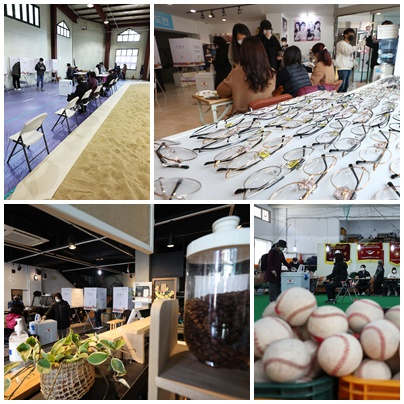 |
(Yonhap) |
A total of 14,464 polling stations were set up across the country for Wednesday’s presidential election.
————————————
Voters with COVID-19 begin voting
March 9, 2022, 6:00 p.m.
Polls closed for regular voters around the country at 6 p.m. Now it’s time for those who have contracted COVID-19 or are under home quarantine to cast their ballots to elect the next president of South Korea.
The National Election Commission plans to wrap up this special voting process at 7:30 p.m., but it may take longer, depending on how many of the 1.16 million COVID-19 patients and self-isolators show up.
During the March 4 and 5 early voting period, the election regulator came under fire for its poor management of ballots cast by virus patients and the quarantined.
It has now made changes in rules for them.
On Wednesday, COVID-19 patients will put their ballot papers directly into voting boxes. Those who participated in early voting had to put their ballots into an envelope and pass it to an election official.
Virus-infected and quarantined voters are allowed to leave home from 5:50 p.m. and would have to wait in a separate area at their respective polling station until general voters complete their voting.
Whether or not all voting stations were able to arrange sufficient waiting areas on such short notice was not confirmed by the election watchdog.
If the voting and counting process go as planned, the NEC expects that the winner will likely become clear as early as 1 a.m.
But it is more likely to take more time as a tight race is expected between the two front-runners, the Democratic Party of Korea‘s Lee Jae-myung and the People Power Party’s Yoon Suk-yeol.
By Park Han-na (hnpark@heraldcorp.com)
————————————
Winner likely to emerge around 1 a.m.: NEC
March 9, 2022, 4:45 p.m.
When will the winner of today’s presidential election become clear?
Probably around 1 a.m. Thursday, according to the National Election Commission on Wednesday.
At 7:30 p.m., which is when polls will close nationwide, exit poll results will be released by major broadcasters.
According to the Korean Broadcasters Association Wednesday, MBC, KBS and SBS will announce the results of their joint survey at 7:30 p.m., based on interviews with voters who cast their ballots between 6 a.m. and 6 p.m. on election day.
This means the results will not ref lect ballots cast by COVID-19 patients and those in quarantine, who are restricted to voting after 6 p.m. Those who who participated in the March 4 and 5 early voting will not be tallied up for the result.
As of 4 p.m., voter turnout was estimated to be 71.1 percent, including the two-day early voting. It is higher than the 67.1 percent reported at the same time in the previous presidential vote in 2017.
By Park Han-na (hnpark@heraldcorp.com)
————————————
Voter turnout exceeds 60% as of 1 p.m.
March 9, 2022, 1:45 p.m.
Voter turnout for South Korea's presidential election surpassed 60 percent as of 1 p.m. Wednesday, with the early voting tally incorporated, according to the country's election authorities.
Out of the total 44.2 million eligible voters nationwide, 27 million, or 61.2 percent, have cast their ballots at 14,464 polling stations since the voting started at 6 a.m., the National Election Commission said.
The preliminary tally, which included the results of the two-day early voting, was higher than 55.5 percent reported at the same time in the previous presidential election in 2017.
By region, Seoul recorded 60.6 percent, the surrounding province of Gyeonggi 59.5 percent and the western port city of Incheon 58.4 percent.
South Jeolla Province posted the highest rate of 70.7 percent, while the southeastern port city of Busan registered the lowest turnout of 58.2 percent.
More than 16 million, or 36.9 percent of the total, already cast their ballots in the early voting Friday and Saturday. (Yonhap)
————————————
What Lee, Yoon said on Election Day
March 9, 2022, 12:25 p.m.
Here’s what two main candidates said on Facebook early Wednesday, as polls opened nationwide to elect the next president of South Korea.
►Lee Jae-myung of Democratic Party of Korea said:
“There’s only one day left.
The election result is going to be neck and neck.
The outcome can be determined by only thousands, or even hundreds, of votes.
… Tonight, I will greet you as the 20th president of the Republic of Korea. Thank you.”
►Yoon Suk-yeol of People Power Party said:
“I still have lingering feelings from yesterday. I was deeply impressed by your overwhelming support despite the rigorous schedule traveling throughout Jeju, Busan, Daegu, Daejeon and Seoul.
Regimental change will come only through voting. Voting makes changes. Voting brings victory.”
By Park Han-na (hnpark@heraldcorp.com)
————————————
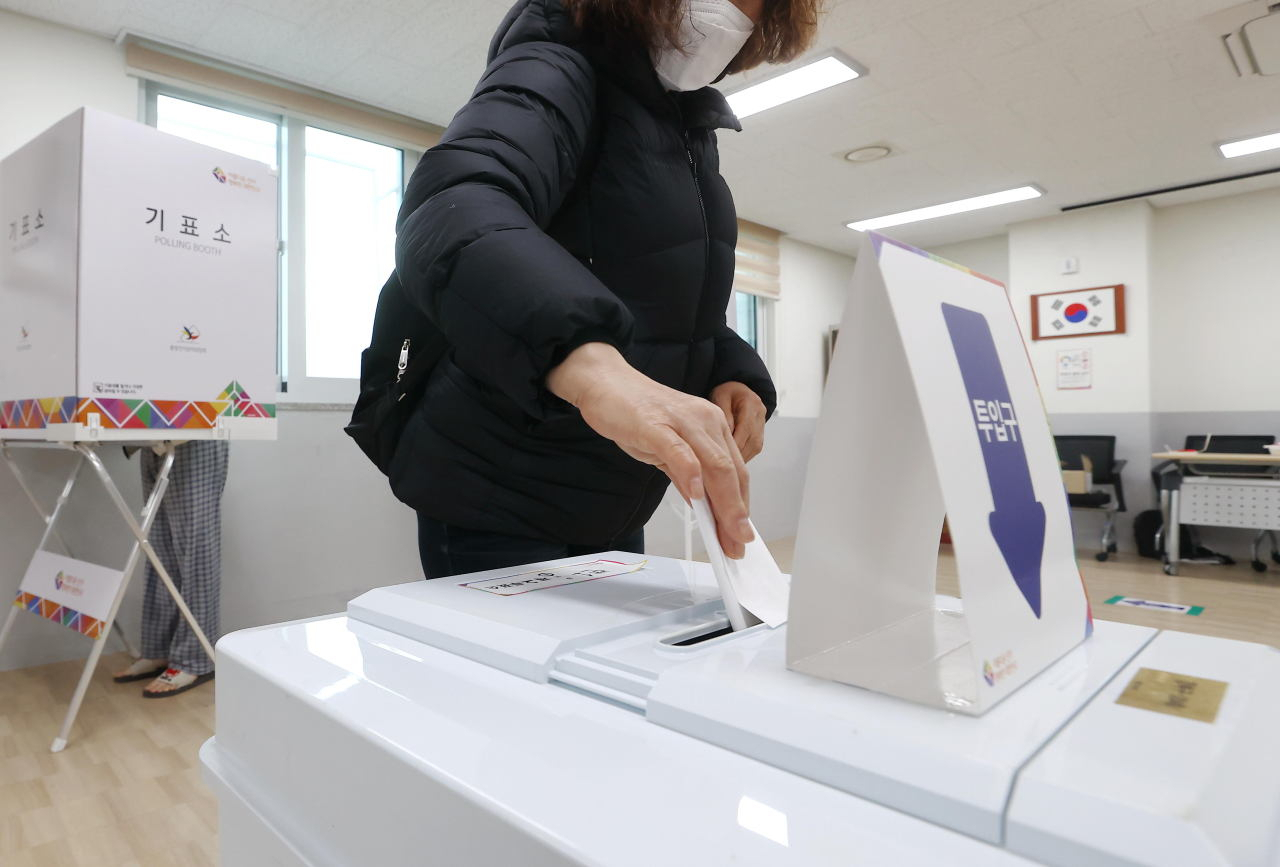 |
A voter puts her ballot in the voting box for South Korea`s 20th presidential election on Wednesday. (Yonhap) |
Voter turnout reaches 16% at 11 am, lower than previous poll
March 9, 2022, 11:30 a.m.
Voter turnout for South Korea's presidential election reached 16 percent as of 11 a.m. Wednesday, according to the country's election authorities.
Out of the total 44.2 million eligible voters nationwide, 7 million had cast their ballots at 14,464 polling stations, five hours after the start of voting, the National Election Commission said.
The turnout was lower than 19.4 percent reported at the same time in the previous presidential election in 2017.
The provisional tally does not include the results of the two-day early voting last week.More than 16 million, or 36.9 percent of the registered voters, already cast their ballots in the early voting Friday and Saturday. (Yonhap)
————————————
Voter turnout at 8.1% at 9 am
March 9, 2022, 9:30 a.m.
As of 9 a.m., average voter turnout was reported to be 8.1 percent nationwide, slightly lower than the 9.4 percent at the same time in the previous presidential election in 2017.
————————————
Election in numbers:
27cm long with 14 names printed on it, your ballot is worth millions
March 9, 2022, 8:30 a.m.
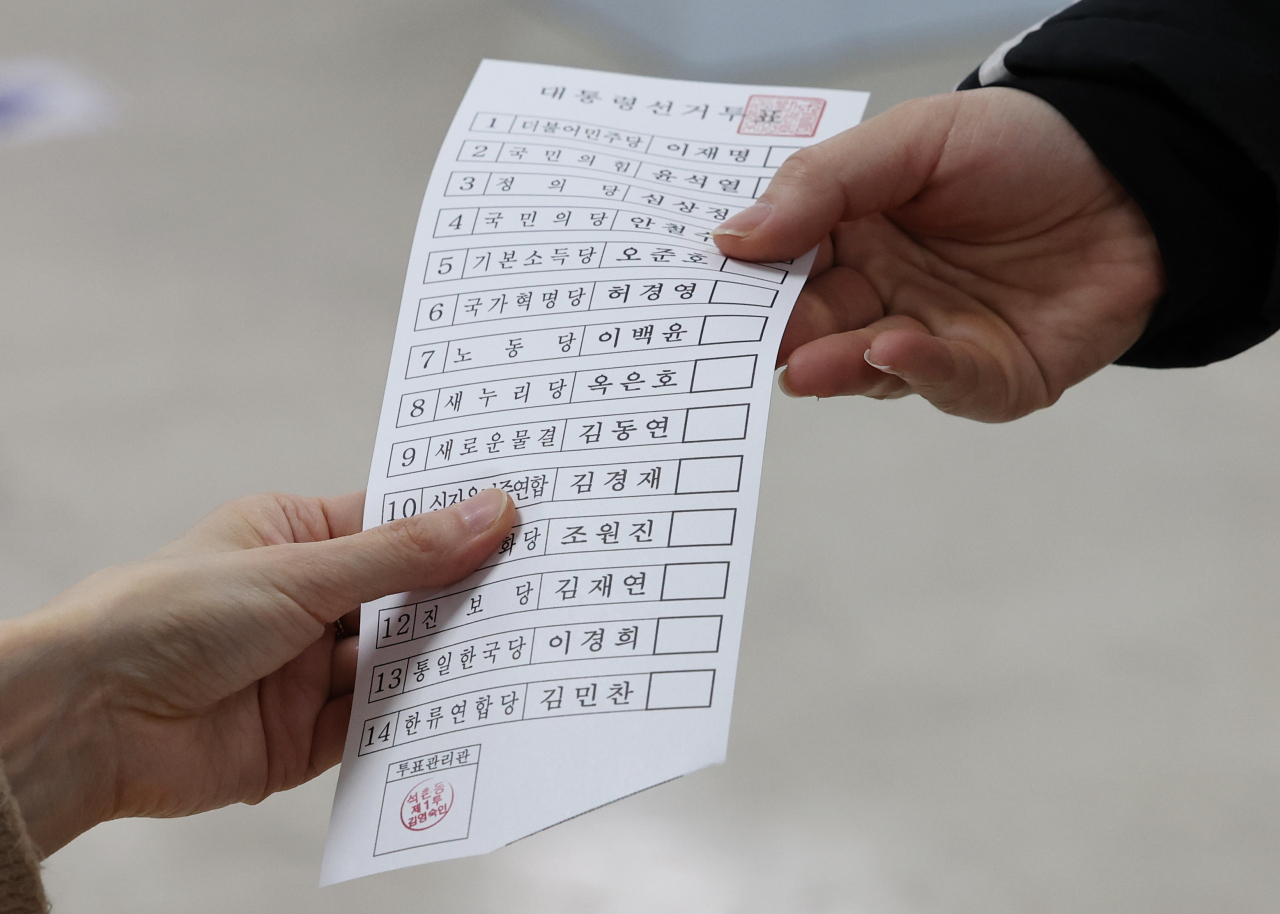 |
The list of candidates for 2022 South Korean Presidential Election appear on a ballot. (Yonhap) |
As Koreans head to the polls to elect their next president, here’s a quick look at the vote by key numbers.
►14: Number of names printed on the ballot paper
Although the race has come down to dead heat between the two frontrunners, representing the main parties of the left and right wings, it started off with 14 candidates registered. Two dropped out, leaving 12 still running.
►27: Length of the ballot paper in centimeters
A single ballot is about 27 centimeters long, listing the 14 candidates, including the two who have quit -- Ahn Cheol-soo and Kim Dong-yeon. Any votes cast for the two will not be counted.
►36.93: Percentage of voters who already cast their ballot during the March 4 and 5 early voting period. This is the highest rate recorded since 2014, when advance voting was introduced in the country.
►44.19 million: Number of eligible voters. Some 8.8 million of them are estimated to be under COVID-19 home recovery or quarantine restrictions.
►5: Local elections being held alongside the presidential vote.
In five constituencies, including Seoul’s Jongno and Seocho districts, voters will also elect their representative for the National Assembly in two reelections and three by-elections. The outcomes of these votes won’t bring about a dramatic change in the dominant position the ruling party has, as it holds 172 seats out of 295 in the unicameral parliament.
►421 billion: Expected expenditures in Korean won for today’s election. Divided by the number of voters, this translates to 9,520 won spent per vote.
►67 million: Value of one person’s vote in Korean won, calculated by dividing the total of government budgets the newly elected president will influence in the next five years by the number of voters.
By Park Han-na (hnpark@heraldcorp.com)
————————————
Election Day arrives
March 9, 2022, 6 a.m.
Polls opened across South Korea at 6 a.m. Wednesday in a presidential election that many voters described as a contest of who’s the least worst.
Lee Jae-myung of the liberal ruling Democratic Party of Korea is vying against Yoon Suk-yeol of the conservative opposition People Power Party in a neck-and-neck race. Exit poll results will be announced at 7:30 p.m. by major broadcasters.
Koreans born before March 11, 2004, are eligible to vote at 14,464 polling stations nationwide. Balloting will continue until 6 p.m., after which COVID-19 patients and those in quarantine will be able to vote until 7:30 p.m.
Nearly 37 percent of voters have already cast their ballots in March 4-5 early voting.
The two front-runners, while both students of law, come from contrasting backgrounds.
Lee, born to a poor family, was a factory worker in his teens. He worked his way up to becoming a lawyer, later the mayor of Seongnam and then governor of Gyeonggi Province, the most populous region in the country.
Yoon, born to a university professor father, was a prosecutor whose investigations on the Lee Myung-bak and Park Geun-hye administrations put him in the national spotlight. He clashed with the Moon Jae-in administration over prosecutorial reform policies and has become one of Moon’s harshest critics.
The race has been marred by scandals involving family members, allegations of corruption and abuse of power and mudslinging.
Whoever wins will get a single, five-year term as the 20th president of South Korea.
By Yoon Min-sik (minsikyoon@heraldcorp.com)







![[Today’s K-pop] Blackpink’s Jennie, Lisa invited to Coachella as solo acts](http://res.heraldm.com/phpwas/restmb_idxmake.php?idx=644&simg=/content/image/2024/11/21/20241121050099_0.jpg)